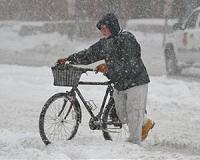| . |  |
. |
Washington (AFP) Jan 13, 2010 International medical charity Medecins sans Frontieres (MSF) struggled Wednesday to cope with a "massive influx" of survivors of the powerful earthquake in Haiti, many with severe injuries, a spokesman said. Patients with "severe traumas, head wounds, crushed limbs" have been streaming into temporary structures set up by MSF in and around Port-au-Prince, but the medical charity is only able to offer them basic medical care, Toronto-based MSF spokesman Paul McPhun told a tele-conference. Though not all of MSF's 800 local and 30 international staff in Haiti have been accounted for, many staff worked through the quake and into the following night and morning, trying to help people injured in the 7.0-strength quake. Many MSF workers were "in structures that fell apart" during the earthquake, and many more "have families who live in precarious conditions in Port-au-Prince and they are trying to establish what happened to their families while they also support emergency care operations," McPhun said. But "teams did try to get out and about in their cars after the quake and were mobbed by people," he said. They reported finding people sleeping on roads that were still passable, and "not completely obstructed with rubble," said McPhun. "Everywhere we go, there's a massive demand from people to help them with trapped family members or people suffering from major injuries. So you're on the streets and you're getting mobbed with people needing medical care," he said. "Teams are basically managing what comes to them. They are already getting overwhelmed." Destruction on the impoverished island nation was "massive, including MSF infrastructure," said McPhun. "All of our health structures are either condemned or collapsed, so we can't use them," he said. One of MSF's emergency care centers collapsed in the earthquake and two others were severely damaged and unusable. "The level of care we can provide without that infrastructure is limited. We are able to provide stablization -- basically first aid -- because we don't have the infrastructure to manage surgery right now. And unfortunately what we're seeing is a large number of patients in critical condition," McPhun said. "We need referral, we need secondary level hospital care, we need surgical care. That's our focus, to try to bring that to them and try to address that. That's our priority," McPhun said. MSF expects within the coming days to be able to send 70 more international aid workers to Haiti to bolster its harried team there. "The challenge now is how to get them there, but we need to get them in there and we need to get them in there fast," he said. Port-au-Prince airport reopened Wednesday, to allow aid shipments to come into the devastated country. MSF was preparing emergency freight shipments, including an inflatable hospital, for dispatch to Haiti, said McPhun. Aid operations in Port-au-Prince have been hampered by a power cut that left the capital in the dark after the quake struck shortly before nightfall on Tuesday, by downed communication lines, and by Haiti's chronic safety woes. But MSF is hoping that the reputation it has established for itself during its 10 or so years in Haiti will provide it with a security cloak as it works to help Haitians recover from the massive quake. MSF is one of few aid organizations that have worked continually in Haiti's 'red zone' -- described by McPhun to AFP as "an area of a certain insecurity level that prohibited many organizations from actively working there without armed escorts." "We have a long history in Haiti and have been identified as a very medical aid organization. We hope that will work in our favor now," McPhun said.
Share This Article With Planet Earth
Related Links Bringing Order To A World Of Disasters A world of storm and tempest When the Earth Quakes
 Swiss hold on to their salt in cold snap
Swiss hold on to their salt in cold snapGeneva (AFP) Jan 12, 2010 Switzerland's main publicly-owned salt works said Tuesday that it had turned down new orders from the snowbound Netherlands and Germany in order to cater for booming domestic needs in the cold snap. Many countries are running low on salt to clear roads in the unusually widespread and lengthy wave of icy weather that has cloaked much of Europe with snow over the past fortnight. Schweizer ... read more |
|
| The content herein, unless otherwise known to be public domain, are Copyright 1995-2009 - SpaceDaily. AFP and UPI Wire Stories are copyright Agence France-Presse and United Press International. ESA Portal Reports are copyright European Space Agency. All NASA sourced material is public domain. Additional copyrights may apply in whole or part to other bona fide parties. Advertising does not imply endorsement,agreement or approval of any opinions, statements or information provided by SpaceDaily on any Web page published or hosted by SpaceDaily. Privacy Statement |